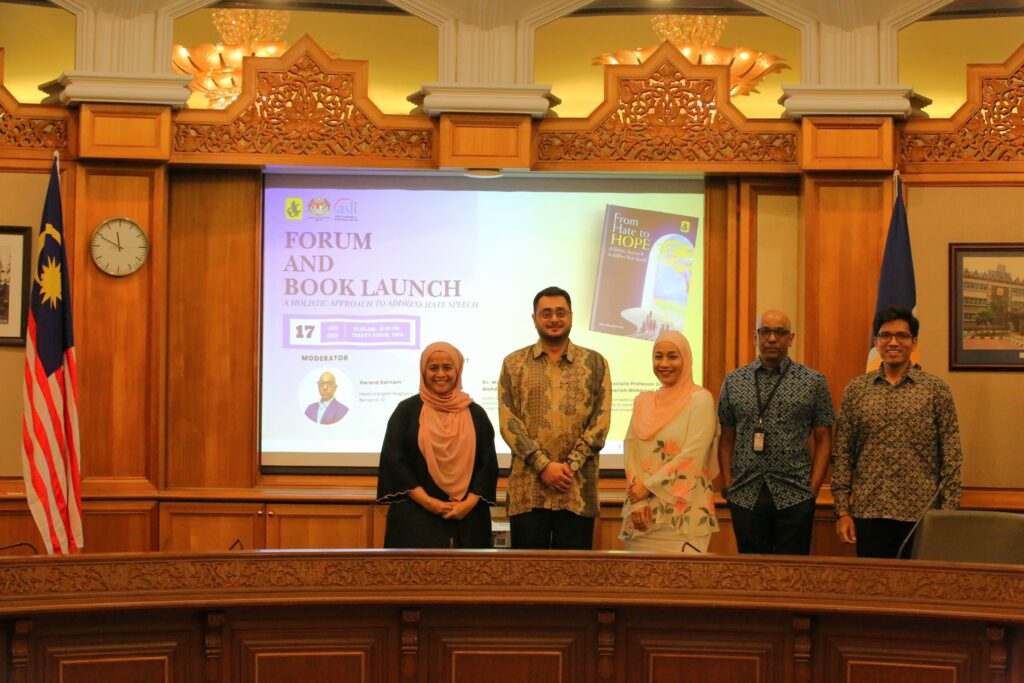
A Book Review of Dr. Murni Wan Mohd Nor’s “From Hate to Hope: A Holistic Approach to Address Hate Speech” and an Analysis of Related Developments in ASEAN
Introduction
While reading the latest book by Dr. Murni Wan Mohd Nor, an Expert Researcher at the Institute of Diplomacy and Foreign Relations (IDFR), titled From Hate to Hope: A Holistic Approach to Address Hate Speech, one question arises: How should ASEAN play its role in combatting hate speech in the Southeast Asian region?
Before delving into that question, we should explore what this book discusses. Published by IDFR, the book primarily explores Malaysia’s experience with hate speech, focusing on the complex intersections of race, religion, and nationalism. One of the key takeaways from this book that should be highlighted and discussed is the politics of language.
Dr. Murni explained that hate speech has been used as a tool to achieve power and dominance by influencing public perception. Hate speech – whether rooted in ethnic, religious, or national divisions – poses a significant threat to social harmony and peace, particularly in a region as diverse as Southeast Asia. It undermines the fabric of trust and mutual respect amongst diverse communities, which threatens peaceful coexistence in the region.
This year, Malaysia holds the ASEAN Chair and has introduced the theme of inclusivity and sustainability. This theme carries significant depth and can be applied to address a variety of issues, including hate speech. As hate speech becomes more widespread in Southeast Asia and beyond, it directly impacts inclusivity by silencing the voices of different groups, particularly the marginalised and oppressed. In addition, it weakens social cohesion, which forms a nation’s foundation—adversely impacting political stability, economic well-being, and national security. In this environment, it becomes difficult to achieve sustainable peace.
Thus, the problem of hate speech – alongside regional issues such as territorial disputes in the South China Sea, geopolitical rivalry between major powers, cyber-security threats, internal political instability, human rights issues, and climate change – all pose a security risk which may disrupt regional stability.
From Animalisation to Dehumanisation and Genocide
Animalisation is a tactic used by political figures to make people believe that the colonisation or elimination of a certain social group is justified because they are seen as having a lower status due to their supposed “animalistic” nature. This concept of animalisation serves as a powerful tool to justify violence, a notion supported by John Locke, who argued that such individuals could be destroyed like “a lion or a tiger, one of those wild savage beasts with whom men can have no society nor security.”
The Israeli Defence Minister, Yoav Gallant made it abundantly clear without any disguise, “We are fighting against animals, not people.” His statement was directed at Hamas to justify Israel’s actions of bombing and killing Palestinian civilians, resulting in the loss of tens of thousands of lives. The animalisation process leads to dehumanisation, where people lose their sense of morality and empathy, viewing those who are “animalised” as not human, but as wild animals that need to be controlled or destroyed to stop them from causing harm.
In the book, Dr. Murni explained that high-ranking Israeli officials went well beyond employing dehumanising statements by referring to Palestinians in general as “human animals,” and “monsters” who deserve it when Israelis “break their backbone” because “an entire nation out there…is responsible.…” She also referenced other human rights lawyers, activists and scholars who highlighted that such vitriol was indicative of Israel’s intent to commit genocide.
What is occurring in Palestine mirrors the situation faced by the Rohingyas in Myanmar; both groups are suffering from similar animalisation. Amnesty International reports an incident where a Rohingya Muslim human rights defender was labelled a “national traitor” in a post shared over 1,000 times, with social media comments that included threatening and racist messages such as, “He is a Muslim. Muslims are dogs and need to be shot,”, specifically referring to the Rohingya community.
Given the situations in Palestine and Myanmar, it is clear how language can be used as a tool for hate through animalisation by removing their humanity. Such rhetoric encourages violence and may even result in genocide.
Depower the Language of Hate; Empower the Language of Hope
As much as language can become a convenient weapon of dehumanisation which often can lead to human rights abuses, war crimes, and crimes against humanity – language can equally be used as a crucial tool of reconciliation and peacebuilding.
Underscoring this critical point, Dr. Murni advocates for a whole-of-nation approach to address hate speech. She believes this multi-stakeholder approach may promise a more effective execution of ideas and yield better results, as it would bring together the government, private sector, NGOs, and grass-roots leaders toward a common goal.
In addition, Dr. Murni advocates for a culture of genuine dialogue by outlining a guideline when responding to hate speech that emphasises patience and rational language. She also encourages the principle of being gentle yet firm when addressing a wrong. This is followed by the need to restrain ourselves from reciprocating hate with even more hate. Instead, she encourages the values of being proportionate and moderate in our recourse.
Dr. Murni also emphasises the importance of responding to hate with what is better, acting with wisdom, and avoiding the need to exaggerate which demonstrates our magnanimity. This guideline is hoped to help achieve the justice needed in combatting hate speech.
ASEAN and the Fight Against Hateful Narratives
As part of its mandate to promote regional stability, and indeed, due to its diverse ethnic and religious makeup, ASEAN has always been at the forefront in addressing human rights issues, including hate speech.
Following the intercommunal conflicts in Myanmar, ASEAN spearheaded the establishment of a five-point consensus (5PC) peace commitment in 2021. The 5PC, which was signed by Myanmar’s military leader and nine other ASEAN heads of states, remains ASEAN’s most notable collective resolve with respect to the deteriorating humanitarian situation caused by ethnic and religious conflict in Myanmar.
To enhance ASEAN’s influence on the global stage and actively address the challenge of hate speech, ASEAN could explore strengthening the role of the ASEAN Intergovernmental Commission on Human Rights (AICHR) to make it more impactful beyond its capacity as a consultative body. If the AICHR is given the mandate to create a complaint and monitoring mechanism for ASEAN member states, the human rights situation in the region would likely improve, especially in tackling hate speech to preserve social harmony, both domestically and regionally.
Malaysia has been prominent in the assertive leadership within the Global South for decades. Coupled with its globally commended vocal stance on global humanitarian issues under the Madani government, Malaysia can thus capitalise on its growing soft power to advocate for the promotion of human rights and mitigation of hate speech in the region and beyond as the chair of ASEAN.
Indeed, hate speech has become more pervasive than ever in our globalised, highly connected world. The proliferation of social media connectivity has meant that the dehumanisation of a people can be carried out at our fingertips, through a simple click of a button. Recognising the problems at hand, Dr. Murni’s new book, From Hate to Hope: A Holistic Approach to Address Hate Speech aims to address this problem bypresenting a practical and holistic approach requiring the whole-of-nation collaboration.
The book offers a glimmer of hope in a hate-fuelled environment by emphasising the importance of diplomacy, effective communication strategies, and most importantly, the power of counterspeech initiatives. Under the ASEAN 2025 theme of inclusivity and sustainability, Malaysia as ASEAN 2025 chair is best positioned to address hate speech in the region and beyond. This will further enhance the country’s and ASEAN’s credibility and relevance on the regional and global stage.
The free PDF copy of From Hate to Hope: A Holistic Approach to Address Hate Speech is now available and can be accessed via https://www.idfr.gov.my/ or https://www.idfr.gov.my/publication/other-publications/2025-publications

